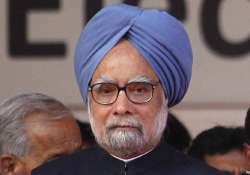India, China begin hectic parleys
Beijing: Bracing for Prime Minister Manmohan Singh's proposed visit here next month, India and China today began a series of meetings on a gamut of bilateral issues that will include talks on border security mechanisms

Beijing: Bracing for Prime Minister Manmohan Singh's proposed visit here next month, India and China today began a series of meetings on a gamut of bilateral issues that will include talks on border security mechanisms next week.
Officials, heading working groups of the annual bilateral Strategic Economic Dialogue (SED), a key forum that focuses on economic and trade cooperation at micro and macro levels, began their four-day meeting here.
This will be followed by the meeting of Working Mechanism for Consultation and Coordination on Border Affairs, a key forum where both sides discuss contentious issues relating to the boundary, including recurring incidents of Chinese military incursions.
The meeting, which will be held here from September 29 to 30, assumes significance as both sides have held hectic parlays during the past few months to hammer out a Border Defence Cooperation Agreement (BDCA) to deal with the tensions arising out of recurring Chinese incursions along the Line of Actual Control (LAC).
The agreement is expected to be signed during Singh's visit which was likely to take place in late October.
Pending the boundary settlement, the agreement was expected to address contentious issues, including patrolling of unmarked borders.
India has initiated broad infrastructure development along the nearly 4000 kilometre-long boundary with plans to build roads and setting up watch towers much to the dislike of Chinese military, which already has a well built network of border development.
The SED meeting is taking place in the backdrop of dwindling bilateral trade between the two countries which dropped to around USD 66 billion last year from a high of USD 74 billion in 2011.
Also, India is insisting on China to open up its markets to address the over USD 28 billion trade deficit.
The last meeting of the SED was held in New Delhi in 2012 between Planning Commission Deputy Chairman Montek Singh Ahluwalia and his Chinese counterpart Zhang Ping, Chairman National Development and Reform Commission, during which the two sides signed several MOUs.
The agreements signed during that meeting included undertaking of joint studies, enhance cooperation in the field of energy efficiency, railway sector, specially developing high speed rail network in India and stepping up cooperation in the field IT and related sectors.
The two sides established five working groups when the SED was established in 2010.
The groups focused on policy coordination, infrastructure, energy, environment protection and high-technology.
Officials say India looks to step up cooperation with China to establish a high speed rail network, specially in the freight sector besides seeking China's participation in infrastructure development.
The two sides are also scheduled to hold a Financial Dialogue involving the Finance Secretaries to discuss the broad outlook of both the countries on global and regional economic issues and also to identify areas of convergence to step up their cooperation.
The two sides are also scheduled to hold Foreign Office Consultations on September 30 which will cover both bilateral and regional issues, officials said.
Officials, heading working groups of the annual bilateral Strategic Economic Dialogue (SED), a key forum that focuses on economic and trade cooperation at micro and macro levels, began their four-day meeting here.
This will be followed by the meeting of Working Mechanism for Consultation and Coordination on Border Affairs, a key forum where both sides discuss contentious issues relating to the boundary, including recurring incidents of Chinese military incursions.
The meeting, which will be held here from September 29 to 30, assumes significance as both sides have held hectic parlays during the past few months to hammer out a Border Defence Cooperation Agreement (BDCA) to deal with the tensions arising out of recurring Chinese incursions along the Line of Actual Control (LAC).
The agreement is expected to be signed during Singh's visit which was likely to take place in late October.
Pending the boundary settlement, the agreement was expected to address contentious issues, including patrolling of unmarked borders.
India has initiated broad infrastructure development along the nearly 4000 kilometre-long boundary with plans to build roads and setting up watch towers much to the dislike of Chinese military, which already has a well built network of border development.
The SED meeting is taking place in the backdrop of dwindling bilateral trade between the two countries which dropped to around USD 66 billion last year from a high of USD 74 billion in 2011.
Also, India is insisting on China to open up its markets to address the over USD 28 billion trade deficit.
The last meeting of the SED was held in New Delhi in 2012 between Planning Commission Deputy Chairman Montek Singh Ahluwalia and his Chinese counterpart Zhang Ping, Chairman National Development and Reform Commission, during which the two sides signed several MOUs.
The agreements signed during that meeting included undertaking of joint studies, enhance cooperation in the field of energy efficiency, railway sector, specially developing high speed rail network in India and stepping up cooperation in the field IT and related sectors.
The two sides established five working groups when the SED was established in 2010.
The groups focused on policy coordination, infrastructure, energy, environment protection and high-technology.
Officials say India looks to step up cooperation with China to establish a high speed rail network, specially in the freight sector besides seeking China's participation in infrastructure development.
The two sides are also scheduled to hold a Financial Dialogue involving the Finance Secretaries to discuss the broad outlook of both the countries on global and regional economic issues and also to identify areas of convergence to step up their cooperation.
The two sides are also scheduled to hold Foreign Office Consultations on September 30 which will cover both bilateral and regional issues, officials said.